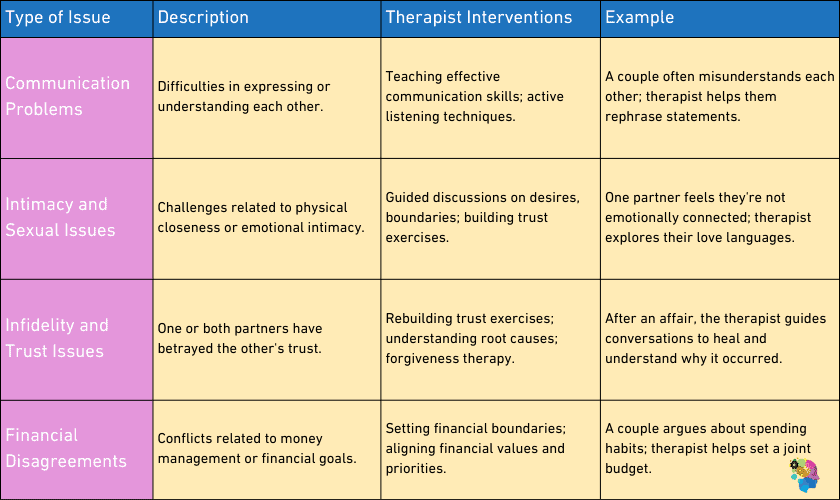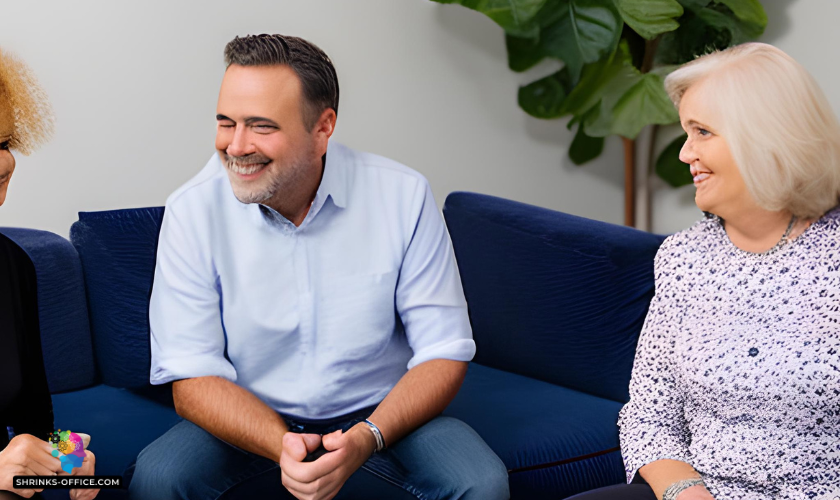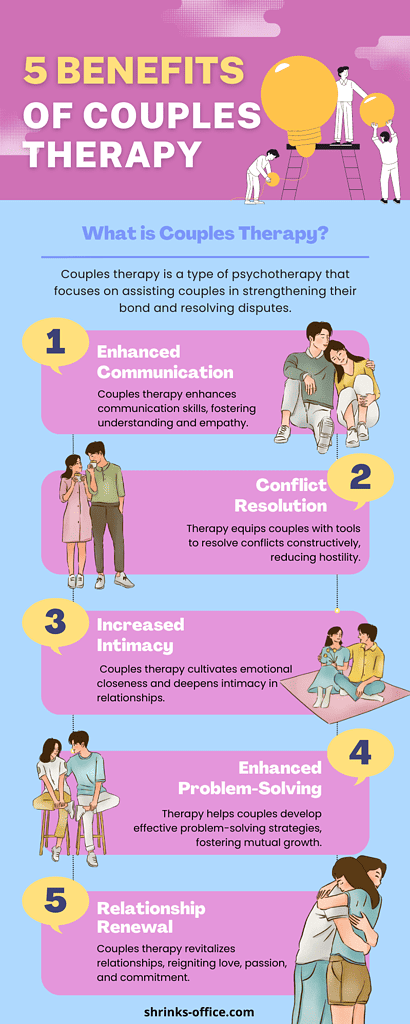In today's fast-paced world, finding moments of mindfulness can be a challenge. Embracing "The Power of Now"...

Couple's therapy, also known as relationship therapy or marital therapy, is a form of psychotherapy that focuses on improving communication, resolving conflicts, and strengthening the emotional connection between partners in a romantic relationship.
- Gottman methodu003cbru003e- Imago relationship therapy (IRT)u003cbru003e- Solutions-focused therapyu003cbru003e- Cognitive behavioral therapy (CBT)
- Improved communicationu003cbru003e- Conflict resolutionu003cbru003e- Enhanced emotional intimacyu003cbru003e- Strengthened bondu003cbru003e- Understanding patternsu003cbru003e- Personal growthu003cbru003e- Increased satisfactionu003cbru003e- Preventing future issuesu003cbru003e- Support during transitionsu003cbru003e- Rebuilding trust
- Gay or straight partnershipsu003cbru003e- Relationships between different racesu003cbru003e- College or young teen partnershipsu003cbru003e- Relationships with a big age difference
u003cimg class=u0022wp-image-1000u0022 style=u0022width: 150px;u0022 src=u0022http://shrinks-office.com/wp-content/uploads/2023/02/couples-book.pngu0022 alt=u0022u0022u003eu003cbru003eu003ca href=u0022https://amzn.to/42XeSDWu0022 target=u0022_blanku0022 rel=u0022noopeneru0022 title=u0022u0022u003eCommunicate Your Feelings (without starting a fight): What to Say and What Not to Say to Your Partner (Mental u0026amp; Emotional Wellness)u003c/au003e
Recent studies have found that over 50% of marriages in the US end in divorce. Research indicates that couples therapy improves relationships and can prevent divorce. Even, if there are many factors that can influence a couple's decision to separate.
Couples therapy is a type of psychotherapy that focuses on assisting couples in strengthening their bond and resolving disputes. Couples counseling, aims to help resolve conflict, improve communication skills, and understand each other better.
A couples therapist is a trained professional who helps partners identify and resolve conflicts, improve communication, and foster a deeper understanding of each other's needs and desires. They employ various therapeutic techniques and strategies to guide couples in developing healthier relationship dynamics. [1]

Emotionally Focused Therapy is an attachment-based approach that aims to help couples develop a secure emotional bond. EFT focuses on identifying and understanding the underlying emotions that drive negative interaction patterns and helps couples develop healthier communication methods.
By fostering a deeper emotional connection, couples can build trust, resolve conflicts, and create lasting change in their relationships.
The Gottman Method, developed by Drs. John and Julie Gottman is based on extensive research on the factors contributing to healthy, long-lasting relationships. This approach improves communication, conflict resolution, and emotional connection by teaching couples specific skills and techniques.
The Gottman Method emphasizes the importance of nurturing friendship, sharing fondness and admiration, turning towards each other, and managing conflicts constructively.
Imago Relationship Therapy, created by Dr. Harville Hendrix and Dr. Helen LaKelly Hunt, is based on the idea that individuals unconsciously choose partners who resemble their early caregivers. This approach helps couples understand the underlying emotional triggers from their past and how these patterns impact their current relationships.
Through structured dialogues and exercises, couples learn to communicate more effectively, empathize with their partner's experiences, and foster a deeper emotional connection.
Cognitive Behavioral Therapy for couples focuses on identifying and changing negative thought patterns and behaviors that contribute to relationship problems. CBT helps couples recognize their unhelpful beliefs, assumptions, and expectations about each other and work together to develop healthier communication and problem-solving strategies.
Couples can develop a more satisfying and resilient partnership by targeting the cognitive and behavioral aspects of relationships.
Solutions-focused therapy
Solutions-Focused Therapy (SFT) is a goal-oriented approach that emphasizes the strengths and resources of couples to help them build a more satisfying and fulfilling relationship. Instead of focusing on past problems or conflicts, SFT encourages couples to identify their desired outcomes and work collaboratively to develop practical, achievable solutions.
By highlighting existing strengths and building on what already works, Solutions-Focused Therapy helps couples create positive change, enhance communication, and foster a greater sense of connection and partnership. [2]

The initial counseling session often starts with basic interview questions concerning the history of the relationship. Afterward, sessions will probably delve deeply into:
The couples therapist, or marriage counseling therapist, entails a number of sessions with a qualified therapist who focuses on couples therapy. The couple's therapist will work with both partners to identify and treat the specific relationship issues that each individual partner is experiencing in the relationship.
The therapist will assist each partner in communicating their ideas, feelings, and needs during these sessions. [3]

When partners struggle to communicate effectively, it can lead to misunderstandings, resentment, and emotional distance. Couples therapy can help by teaching new communication skills and facilitating open, honest conversations between partners.
Example: Jane and John constantly argued over seemingly trivial matters. Through couples therapy, they learned to express their thoughts and feelings more effectively, which improved their understanding of each other and reduced the frequency and intensity of their arguments.
Couples dealing with infidelity or trust issues can benefit from therapy by addressing the underlying problems and rebuilding trust in a safe, supportive environment.
Example: After Sarah discovered that her partner, Tom, had an affair, they decided to attend couples therapy. The therapist helped them explore the reasons behind the infidelity, develop strategies for rebuilding trust, and establish healthier boundaries in their relationship.
Couples facing significant changes, such as moving, career changes, or having children, may benefit from therapy as they navigate these challenges together.
Example: When Lisa and Mark decided to start a family, they struggled to adjust to their new roles as parents. Couples therapy helped them develop coping strategies and improve communication, allowing them to adapt to their unique situation more effectively.
Couples who cannot resolve conflicts healthily can learn new strategies for handling disagreements through therapy, leading to a more harmonious relationship.
Example: Emily and Brian attended couples therapy to address their ongoing financial conflicts. The therapist helped them identify their values and beliefs around money and develop a mutually acceptable budget plan.
Couples facing emotional or physical intimacy issues can benefit from therapy by exploring the root causes and working together to rebuild closeness and connection.
Example: After several years of marriage, Karen and Paul noticed their emotional and physical intimacy was fading. Couples therapy helped them identify underlying issues, such as unresolved resentment and unmet emotional needs, allowing them to rekindle their connection. [4]

Look for a therapist who is trained and experienced in couples therapy. They should have a degree in psychology, counseling, or a related field and be licensed or registered with a professional organization in their region. Some therapists also have additional certifications in specific therapeutic approaches, such as Emotionally Focused Therapy (EFT) or the Gottman Method.
Ask friends or family members if they can recommend a couples therapist they found helpful. Personal recommendations can be valuable, as they come from people who have experienced the therapist's approach firsthand. However, remember that what works for one couple might not necessarily work for another.
Use online directories and review websites to search for couples therapists in your area. Websites like Psychology Today, GoodTherapy, and the American Association for Marriage and Family Therapy (AAMFT) offer searchable databases that allow you to filter results based on location, specialization, and other criteria.
Research different therapeutic approaches to couples therapy, such as EFT, the Gottman Method, or Imago Relationship Therapy. Once you understand these methods better, you can look for therapists who specialize in the approach that resonates most with you and your partner.
Many therapists offer an initial consultation for free or at a reduced cost. Use this opportunity to ask questions, discuss your concerns, and understand the therapist's style and approach. It's essential for both you and your partner to feel comfortable and confident in the therapist's ability to help you.
Remember that a solid therapeutic alliance, or the connection between the therapist and the clients, is essential for successful therapy. Look for an empathetic, respectful, and non-judgmental therapist with whom you and your partner feel comfortable sharing your thoughts and feelings.
Consider the therapist's office location, availability, and fees. Ensure their schedule aligns with yours and their prices are within your budget. Some therapists offer sliding scale fees or accept insurance, which can help make therapy more affordable.

Couples therapy sessions usually last between 50 minutes to 1 hour, although some therapists may offer longer sessions if needed. In some cases, especially in the beginning or during intensive therapy, sessions may last up to 1.5 to 2 hours.
Couples therapy sessions are typically scheduled once weekly or every other week, depending on the couple's needs and the therapist's recommendation. Some therapists may suggest more frequent sessions in the beginning or during particularly challenging times, while others may attend space sessions further apart as progress is made.
Couples therapy sessions often involve a combination of discussion, reflection, and practical exercises designed to help couples improve their communication, understand each other's perspectives, and develop new skills for managing conflicts and solving problems. Some everyday activities and exercises include:
In some cases, the therapist may recommend individual sessions for each partner in addition to couples sessions. This can help address personal issues contributing to relationship difficulties and provide a safe space for each partner to explore their feelings and experiences. [5]

Couples therapy provides partners with the tools and techniques to improve their relationship satisfaction. Couples can work together by addressing underlying issues, fostering open communication, and building emotional intimacy to create a more fulfilling and harmonious partnership.
This process may involve setting realistic expectations, identifying shared values and goals, and cultivating a mutual understanding's needs and desires.
Couples therapy also aims to nurture trust and emotional intimacy between partners. By addressing unresolved issues and fostering open communication, couples can establish a strong foundation of trust and develop a deeper emotional bond.
Couples therapy equips partners with assertive communication techniques, active listening, and problem-solving strategies that enable them to collaborate effectively in resolving conflicts. By applying these methods, both individuals can reach mutually satisfying solutions to their disagreements, fostering a healthier relationship dynamic.
Through couples therapy, partners gain insights into their attitudes, emotions, and behaviors, allowing them to recognize how these factors contribute to relationship challenges. Increased self-awareness promotes personal growth and facilitates more empathetic and constructive partner interactions.
Couples therapy helps partners develop trust in their ability to manage relationship ups and downs. As they enhance their communication and problem-solving skills, they also become more adept at handling challenges in other aspects of their lives, contributing to a stronger sense of self and a more resilient partnership.
Addressing relationship issues and improving communication and connection through couples therapy enables partners to alleviate emotional stress and enhance their mental and emotional well-being. Working together can create a more supportive and satisfying relationship dynamic.
Couples counseling assists partners in identifying factors that may be impacting their intimacy and guides how to strengthen their emotional bond. By addressing these issues, teams can work together to nurture a more profound sense of connection and closeness.
A therapist guides partners through active listening and helps them develop practical interpersonal skills during couples therapy. As partners learn to listen and respond to each other empathetically, they foster a deeper understanding and connection, promoting a healthier and more harmonious relationship. [6]
That therapy only serves as a "last resort" for couples on the brink of divorce. It's important to know that couples counseling is beneficial not just for crisis intervention, but also for the prevention of potential issues and strengthening existing relationships.
Yes, marriage and family therapists can help to restore a relationship that has been damaged due to conflict or other issues. It does depend on if you want to work towards a solution with your partner with the help of our couples therapist.
No, couples therapy is meant to be an open and honest forum for both partners to express their concerns and work together on finding a solution. No topic should be off-limits unless it violates the ethical standards of the therapist.
⚠️ Disclaimer: The content of this video is for informational purposes only and is not a substitute for professional medical advice or treatment. Consult a qualified health professional for any medical concerns.
In today's fast-paced world, finding moments of mindfulness can be a challenge. Embracing "The Power of Now"...
In our fast-paced world, finding moments of tranquility can be a challenge. Meditation apps offer a convenient...
In our fast-paced world, taking time for self-reflection and mindfulness is essential for well-being. Journaling can be...
In today’s fast-paced world, managing stress has become an essential aspect of maintaining overall well-being. Two popular...
Dissociation can be a challenging experience, especially the one that happens at work. Are you experiencing dissociation?...
Bionic reading transforms the reading experience for ADHD individuals by guiding the eyes for focus and understanding. Dive into the world of bionic reading.
Explore the complexities of postpartum depression and genetics in our blog 'Is Postpartum Depression Hereditary?' for insights into maternal mental health.
